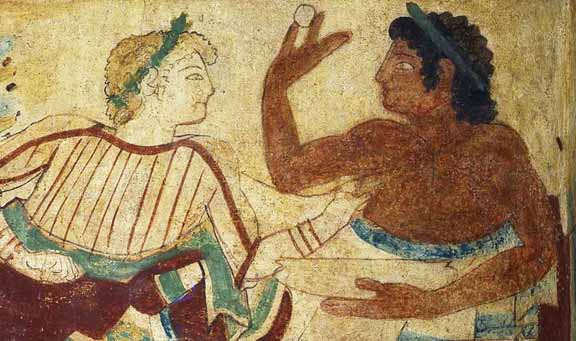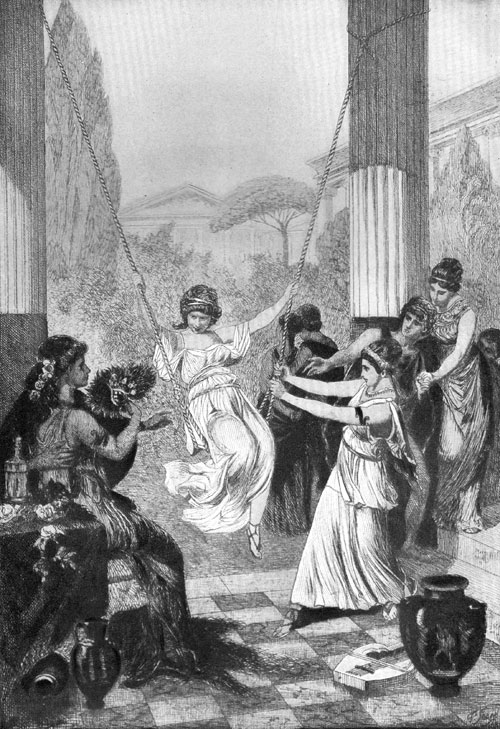Excerpted from the tenth article of William Pierce’s “Who We Are: a Series of Articles on the History of the White Race”:
Greece was invaded by Greek-speaking Northerners several times during prehistory. Those who arrived in the period 2,100-1,900 B.C. founded the great Mycenaean civilization, which flourished from the end of the l6th century until about 1,200 B.C.
Homer, whose Iliad and Odyssey describe Mycenaean Greece, refers to the Greeks, or Hellenes, inclusively as “Achaeans.” In fact, however, the Achaeans were only one of the Hellenic tribes which were in Greece in Mycenaean times.
Aeolians and Ionians
In addition to the Achaeans, who occupied most of the Peloponnesus (the southern peninsula of Greece, in which Mycenae was located), there were the Aeolians and the Ionians, who occupied other portions of the mainland, many of the Aegean islands, and the west coast of Asia Minor. The Ionians, in particular, settled in Attica and were the founders of Athens.
These tribal divisions apparently predate the arrival of the first Hellenes in Greece, and it seems likely that the Achaeans, Aeolians, and Ionians invaded the Aegean region separately, over a period of several centuries.
And there were also the non-Greek Pelasgians, the Mediterranean aborigines, who occupied the lowest stratum of Greek society and substantially outnumbered the Hellenes in Mycenaean times. As pointed out in the last installment, the Mycenaean Greeks were influenced culturally by these Mediterraneans—and, as time passed, racially as well.
Divine-Born Heroes
In the late 14th and early 13th centuries B.C. more Greek-speaking Indo-Europeans arrived, coming westward across the Aegean in ships. They were Homer’s “divine born” heroes, the fathers and grandfathers of the warriors who sacked Troy about 1,250 B.C.: golden-haired Achilles, the sons of Atreus, and the other princes and kings of the Iliad. They settled in Greece, founded dynasties, and lived in a manner remarkably like that of northern Europe’s feudal lords more than 20 centuries later.
A couple of generations after the fall of Troy—exactly 80 years afterward, according to Greek tradition—a new group of divine-born warriors swept down on Greece, this time from the north. They were the Heraclidae, the supposed descendants of the blond demigod Hercules, and with them came the Dorians, the last of the major Hellenic tribes to reach the Aegean region.
Dorian Invasion
The Dorians, who had settled in central Greece a few years earlier, proceeded to conquer the Achaeans, occupy the Peloponnesus, and extinguish Mycenaean civilization. But, in so doing, they prepared the way for the rise of a new civilization which would greatly surpass the old one.
The Dorian invasion was actually a more complex phenomenon than the preceding lines might suggest. It involved repeated interactions with other peoples on a protracted journey which, although generally southward, included a number of detours, loops, and rest stops. And their legendary leaders, the Heraclidae, had already been south once before, prior to the Trojan war.
It also involved the displacement of other peoples, and it came during a period when lesser Greek-speaking tribes were undertaking invasions of their own to the south. Displaced Achaeans, Aeolians, and Ionians migrated to new areas, sometimes displacing those people already there and sometimes amalgamating with them.
Blond but Rude
The Dorians were blonder than the Achaeans they conquered, but that is only because the Achaeans had been mixing with the Mediterranean aborigines for several centuries before the Dorians arrived; originally the two tribes had been of the same racial composition.
 But the Achaeans were certainly more civilized than the rude, new arrivals from the north, and it was 400 years before Greece recovered from the cultural shock of the Dorian invasion. When the civilization of Classical Greece bloomed in the seventh century B.C., it comprised some elements of the old, Mycenaean culture and some which were the consequence of the social, political, and demographic changes wrought by the newcomers.
But the Achaeans were certainly more civilized than the rude, new arrivals from the north, and it was 400 years before Greece recovered from the cultural shock of the Dorian invasion. When the civilization of Classical Greece bloomed in the seventh century B.C., it comprised some elements of the old, Mycenaean culture and some which were the consequence of the social, political, and demographic changes wrought by the newcomers.
Dark Age
The four centuries between the Dorian invasion and the flowering of the literate Classical civilization are referred to by most historians as “the Dark Age,” for much the same reasons that the period between the fall of Rome, more than 15 centuries later, and the flowering of Mediaeval civilization is also called “the Dark Ages.”
In both cases a people of an older civilization, who had begun to succumb to racial mixing and decadence, was overwhelmed by a more vigorous and racially healthier but culturally less advanced people from the north. And in both cases a period of gestation took place over a dozen generations or so, during which a synthesis of old and new elements, racial and cultural, occurred, before a new and different civilization arose from the ruins of the old.
Historians’ Bias
Unfortunately, most historians tacitly assume that the records of political and cultural activity which have come down to us from periods of civilized literacy provide all the data needed to yield an understanding of the historical process. The state of development and degree of organization and complexity of city life are taken as a yardstick by which to evaluate the significance or historical importance of a particular period. And if one’s standards of value are geared to such things as the volume of commerce, the gross national product, or even the intensity of scientific, literary, and artistic activity, such a yardstick may seem, at first glance, to be proper.
Racial Values
But there are other standards of value, such as those of the National Alliance, which differ somewhat from the customary ones. For it is not in the external forms of organization and activity of a people that we see the most important criteria for making a judgment as to the significance of a particular period, but rather in the actual racial constitution of a people and in the dynamic processes which, for better or worse, are influencing that racial constitution.
 Although the basic racial constitution of a people is always intimately related to that people’s achievements in commerce, science, industry, art, politics, and warfare, still the two sets of criteria can lead to fundamentally different evaluations of a given historical period.
Although the basic racial constitution of a people is always intimately related to that people’s achievements in commerce, science, industry, art, politics, and warfare, still the two sets of criteria can lead to fundamentally different evaluations of a given historical period.
This is a consequence of the fact that race building and decay are usually strongly out of phase with civilization building and decay.
Rise and Fall of Races
Thus, the long ages between the periods of maximum civil activity—ages which the historian customarily ignores as being of only slight importance—may very well be periods of the greatest interest from a standpoint of racial dynamics.
It is, of course, true that the periods of maximum civil activity are precisely those which yield a maximum of written records, artifacts, and the other raw materials from which the historian builds his tale. But relative abundance of evidence should not be interpreted as equivalent to relative historical significance, regardless of the historian’s value criteria.
The record of the rise and fall of pure races constitutes the primary history of mankind, and the rise and fall of civilizations occupy a place of secondary importance. This statement may seem self-evident to those already accustomed to looking at history from a racial viewpoint, but it is by no means generally accepted by historians today. Until it is, much historical writing will continue to be flawed in a fundamental way.
